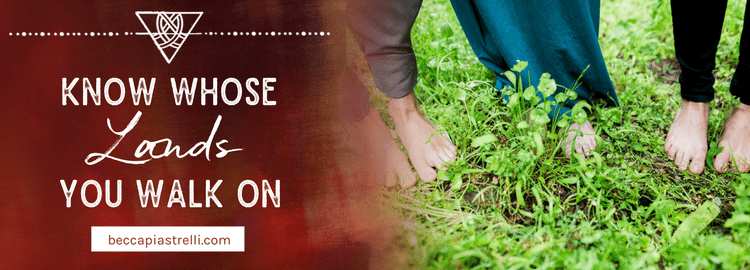
The teacher began the class by giving her name, the name of the original lands of her ancestral people (Poland, Ukraine, Croatia), the names of her teachers, and her preferred pronoun.
I appreciated this way opening the class—by naming her lineage, sharing her origin story, and letting us know how she would like to be identified. It felt progressive and rooted, and I was here for it.
But what she said next created a profound shift in my body…
I currently live on the unceded ancestral lands of the Multnomah, Clackamas, and Kalapuya Tualatin people at the confluence of the waters of the Columbia and Willamette, also called Portland.
Oof. Those words felt different and important and a bit unsettling.
This woman was acknowledging something I knew but had never really allowed myself to fully feel the impact of.
Her ancestors (and my own) are not of this land we claim as home now.
In fact, it is highly likely that her ancestors (and my own) forcibly took the land away from the people who were here first. And here we were, sitting in our well-warmed and plumbed homes built on earth that contains the bones of the original ancestors of this place.
My first honest thought was, “Ouchie! I don’t want to feel this pain of colonization. Let’s try to forget about this ok?”
My second thought was, “Crap! I don’t know whose tribal lands I currently occupy. I must find that out. I don’t want to fall back asleep on this.”
All it took was a quick consult with Grandmother Google to find out the names of the indigenous tribe that lived on the land I call home.
They are the Coast Miwok.
They hunted salmon in the springtime and harvested seaweed and acorns.
Coyote is their ancestor.
Their native language is no longer spoken.
Now, when I begin my gatherings or courses, I make sure to weave in honoring of these people and their land.
I name them. I name the mountain I live under that still provides the water I drink. I acknowledge that I am but a guest here.
You may be reading this and be wondering whose ancestral lands you live on.
I invite you to listen to that wonder and follow through to find out.
Something I’ve also noticed is that the shame or discomfort in decolonization work can create a block to simply getting your researcher hat on and finding out these truths of our past.
You may feel hesitant to name the land you are on because the reasons their people no longer claim it as their own are often violent and deeply sad. It may feel weird to acknowledge a truth where it feels like you shouldn’t be there, and yet there you are.
But as my friend Darla Antoine says, we can heal the pain of what our ancestors did. We can make cultural reparations. We are alive here and now with so many privileges our ancestors didn’t have.
One of the ways you can start is knowing whose land you are on. It can be the first step to really belonging where you are.
So I’m going to make this easier for you.
A sister in The Creative Sisterhood (shout out to Sarah Shotts!) found this amazing resource for finding out what tribal territory you live on called Native Land.
It is one of the most comprehensive resources I have found and is committed to continuously updating it as more information becomes available (because history is always written by the victors, it is often skewed or biased).
But I invite you to keep going from there.
Look into your local tribes. Where are the descendants of their ancestors today? How can you support them in thriving today? How are their traditions being preserved and how can you support them without colonizing?
I’d love to hear from you.
Who are the original ancestors of the land you currently live on? Let’s honor them in the comments below by writing their names.
Continue your journey: